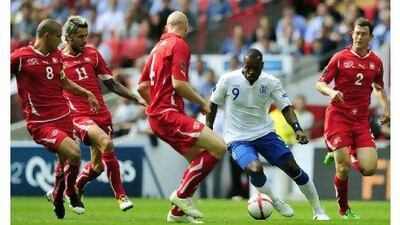LONDON // Different players, altered methods, same old summer letdown. It is just 11 months since Fabio Capello sat in a Bloemfontein interview room attempting to explain a comprehensive World Cup elimination at the hands of a young, tactically flexible Germany side. Capello blamed the blatantly errant refereeing decision that would have brought England level at 2-2 in
a match eventually lost 4-1, but his central focus was on refusing to resign a position he would happily have been sacked from.
Much of his squad had been exhausted by the time they reached South Africa. They ill appreciated the sterile atmosphere and enforced rest hours of their training camp, and divided themselves in two over John Terry's demands for a change of strategy and starting line-up. If Capello put down that coup in a manner befitting his nationality, it was to be his finest moment in Africa.
England edged through to the knockout round with a return to schoolground basics 4-4-2. It was enough to overcome Slovenia, but blatantly lacking against the Germans. Frank Lampard and Gareth Barry were painfully outnumbered in the midfield as Mesut Ozil and Thomas Muller accelerated past the latter. Steven Gerrard was isolated on the left wing, Wayne Rooney short of form and fitness in attack, and Jermain Defoe experiencing one of those days when you wonder how he's achieved the status
he has in the Premier League.
Contrast the World Cup with Wembley yesterday. First, we had Capello talking of an abbreviated preparation period where "in training the players have been like children wanting to play". All but Manchester United's Champions League combatants had an entire week off before reporting for sessions that began only on Tuesday. More important, though, was the belief that England entered the tie with a system suited to the modern game.
The switch to the 4-1-2-3 that overwhelmed Wales in March had done two things. It strengthened England's numbers in the centre of the pitch, offering options to control possession and pick more sensible passes. It also placed each of the starting eleven in positions they are accustomed to. No shoehorning Lampard into a holding role; no Gerrard stationed uncomfortably wide.
As in Cardiff, four of the starters were not even part of Capello's eccentric final selection for South Africa. As against the Welsh, Scott Parker patrolled the space in front of the back four, Jack Wilshere played as a box-to-box midfielder, and Darren Bent was a centre forward with confidence. On the right wing, Theo Walcott somewhat strangelyreplaced Ashley Young. With Joe Hart as goalkeeper and Rio Ferdinand in central defence, there were a total of six personnel changes to the Bloemfontein bullied.
Perhaps Capello's greatest fortune has lain in the accelerated development of Wilshere. Still a teenager, this was the 60th outing of a season in which the midfielder has established himself as an individual capable of competing on level terms with Europe's best. With Arsenal in the Camp Nou it was Wilshere taking on Xavi and Andres Iniesta for invention and audacity in the game's central battleground. The immature back-heel that cost Arsenal the opening goal span off Cesc Fabregas' boot.
Such preternatural quality, however, can come with costs. John Terry had lauded Wilshere's "Zola-esque" ability on the eve of the game. As England regressed to familiar failings in the early minutes, the captain's over-eagerness to find Wilshere in a crowded pitch ceded possession to Switzerland that almost brought an Eren Derdiyok opener.
With Milner and Walcott instructed to hug the touchlines, Capello had unnecessarily shorthanded England in the central areas. Passes tended to drift back to Joe Hart to drive long; possession - and confidence - went the way of the Swiss. On more than one occasion, Wilshere attempted to force the play and only succeeded in overrunning the ball into danger.
Aggravating the situation was a tendency to conceded unnecessary free kicks. With Derdiyok troubling Terry and Ferdinand, aerial defence was not its usual point of strength for the English, and one set piece too many sent them behind.
Tranquillo Barnetta earned the free kick on the left by sucking Frank Lampard into a trip. Taking it himself, the left winger aimed for the back post, watched his delivery curl over the overmanned Ferdinand and bounce beyond Hart into the goal.
Three minutes later, Parker tripped Reto Zeigler some 10 yards closer to the goalline. Again Barnetta stood over the dead ball and Hart, understandably conscious of a repeat embarrassment shuffled an extra step or two towards his back post. Cleverly, Barnetta targeted the nearer upright, Milner left a hole in the wall, and the ball sped in off the goalkeeper's outstretched leg.
Now Wilshere demonstrated his elan, scampering into the area to draw a reckless challenge from Johan Djourou. His Arsenal team-mate might have seen red for denying a scoring opportunity, but the referee settled for a penalty. Lampard's spot kick was just powerful enough to escape Diego Benaglio.
With Leighton Baines an increasingly effective presence as a substitute left back and Young restored to the attack at halftime, England discovered their urgency. Djourou was excused a trip on Walcott, before Milner, Baines and Young combined for an impressive equaliser.
Seconds after collecting a lunging yellow card, Wilshere ran from deep to propel the perfect pass to Bent. If Benaglio's reactions foiled the striker here, a painfully elevated shank was to cost him the next time Wilshere coolly created. The half wasEngland's, the points were not.
For Fabio, summer's a beach.

